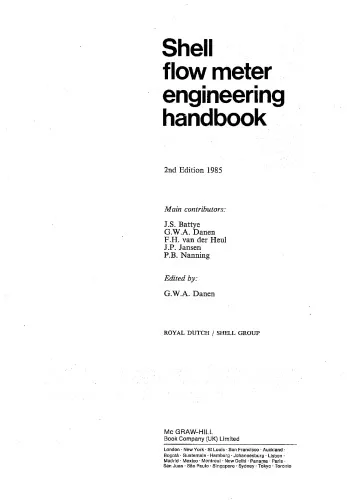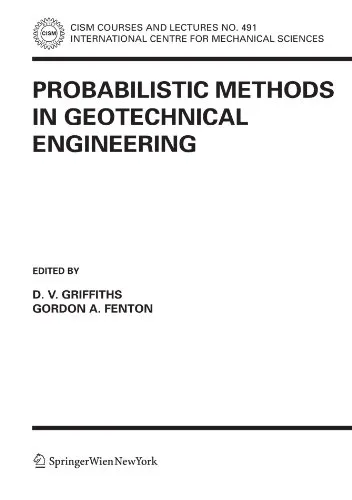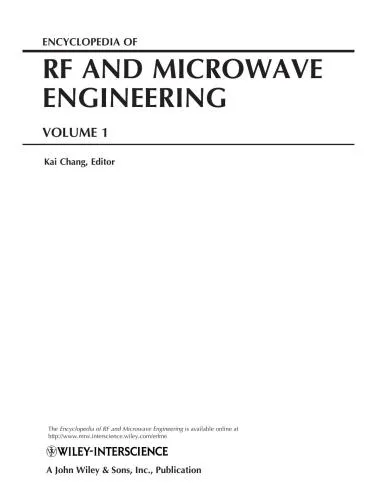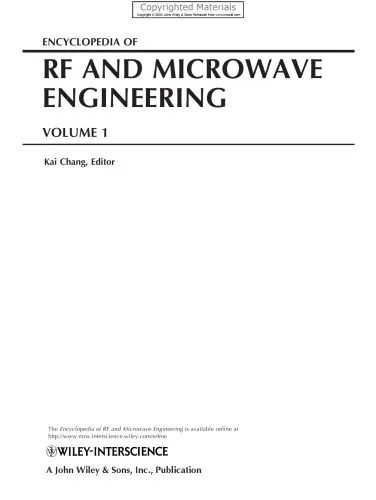Springer Series in Reliability Engineering
4.8
Reviews from our users

You Can Ask your questions from this book's AI after Login
Each download or ask from book AI costs 2 points. To earn more free points, please visit the Points Guide Page and complete some valuable actions.Related Refrences:
Analytical Summary
The Springer Series in Reliability Engineering stands as a recognized scholarly platform dedicated to the advancement of reliability science and engineering practice. Designed for academics, researchers, and industry experts, this body of work encompasses a wide range of topics—from statistical reliability modeling to the application of risk assessment methodologies in complex systems. By combining theoretical rigor with practical insights, it builds an essential bridge between conceptual understanding and real-world implementation.
Each volume in the series is authored by leading experts who contribute deep, specialized knowledge in their respective domains. Whether the topic concerns advanced probabilistic methods, fault tolerance in engineering design, or system safety protocols, the series delivers clarity alongside scientific depth. This approach addresses the needs of readers seeking both foundational principles and cutting-edge research applications.
The breadth of material means the series goes beyond conventional reliability textbooks, integrating industry case studies, analytical frameworks, and cross-disciplinary modeling techniques. Such diversity makes the Springer Series in Reliability Engineering a living resource for those eager to confront the challenges in modern engineering reliability.
Key Takeaways
Readers of this series gain a comprehensive understanding of the tools, methodologies, and philosophies that drive reliability engineering forward. It serves as a structured gateway into the discipline, offering progressive depth for those committed to mastering reliability analysis and risk assessment.
A major takeaway is the balanced emphasis on both the theoretical underpinnings and hands-on applications. The series does not restrict itself to abstract statistical models; it vigorously addresses how these models interface with operational realities in sectors such as energy, transportation, and manufacturing.
Another significant insight is its global relevance—principles applied across diverse engineering contexts are documented with a view toward universality. This helps professionals translate concepts into varied environments without diluting their accuracy or efficacy.
Finally, the structured progression of topics ensures that readers can develop a layered understanding—from basic reliability measures to advanced system risk evaluations—making it suitable for lifelong learning and professional reference.
Memorable Quotes
Reliability is about more than survival; it is about consistent functionality over time. Unknown
Without rigorous risk assessment, engineering decisions become calculated guesses. Unknown
Data drives reliability engineering, but informed judgment powers its application. Unknown
Why This Book Matters
In an era defined by technological complexity and interdependent systems, the Springer Series in Reliability Engineering provides the necessary compass for navigating uncertainty. By integrating reliability analysis and risk assessment practices, the series empowers engineers to design, evaluate, and maintain systems that meet demanding safety and performance standards.
Its relevance stretches across industries, from aerospace engineering to renewable energy infrastructure. The methodologies presented help in identifying vulnerabilities, calculating probabilities of failure, and developing strategies to minimize risk.
With today's emphasis on sustainability and resilience, a well-grounded understanding of reliability principles is not optional—it is imperative. This series condenses decades of accumulated expertise into accessible, academically vetted volumes that support decision-making in high-stakes environments.
Publication year and specific award information are unavailable due to the absence of reliable public sources, yet the influence of the series in scholarly and industrial circles is evident from continued citations and adoption in curricula worldwide.
Inspiring Conclusion
The Springer Series in Reliability Engineering is more than literature—it is a toolkit for innovation and resilience. By guiding readers from core principles to advanced applications, it strengthens the ability to confront complexity with confidence.
For academics, it validates research directions with a robust theoretical backbone; for professionals, it illuminates practical pathways to enhance system reliability. Its dual focus ensures that every reader, regardless of their role, can find valuable strategies to implement immediately.
Whether you are preparing to design safety-critical systems, evaluate industrial risks, or contribute to scholarly discourse, let this series be your trusted reference. Read it, share its insights with peers, and engage in discussions that push the boundaries of what reliability engineering can achieve.
Free Direct Download
You Can Download this book after Login
Accessing books through legal platforms and public libraries not only supports the rights of authors and publishers but also contributes to the sustainability of reading culture. Before downloading, please take a moment to consider these options.
Find this book on other platforms:
WorldCat helps you find books in libraries worldwide.
See ratings, reviews, and discussions on Goodreads.
Find and buy rare or used books on AbeBooks.
1123
بازدید4.8
امتیاز0
نظر98%
رضایتReviews:
4.8
Based on 0 users review
Questions & Answers
Ask questions about this book or help others by answering
No questions yet. Be the first to ask!













